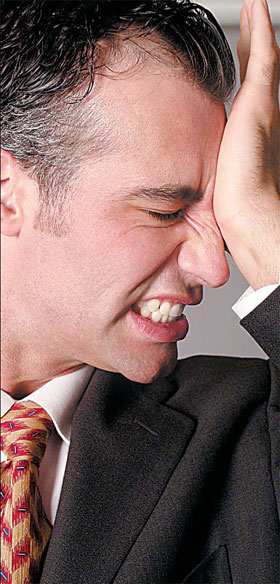Stress leads to daily grind
BERLIN: The alarm clock rings and you slowly lift your body from the bed. Your eyes are not fully open yet and there's a pain in your jaw that is so rigid you can feel the pressure right up to your temples.
"They are indications of teeth grinding at night - something you must tell your dentist about," says Professor Stephan Doering, director of the department of psychosomatic medicine in dentistry at the University Clinic of Munster, western Germany.
The medical term used to describe the unconscious act of teeth grinding and clenching of the jaws is bruxism.
Only a small proportion of the people who grind their teeth at night are aware it's happening. "It's usually the partner in bed who complains first," says Doering.
|
During daylight hours people with bruxism often clench their teeth when under stress. Quanjing |
During daylight hours, it's common for people with bruxism to clench their teeth when under stress: "While driving a car, taking an exam or when concentrating on a task."
There are several causes of bruxism. In many cases psychosomatic factors play a role, as well as poor stress-management abilities.
"It's the human version of snarling in animals," says Ingrid Peroz, who lectures in jaw-bone issues at Berlin's Charite hospital. "Unfortunately, people are not allowed to scream when they're in a stressful situation or are feeling aggressive."
Most people with bruxism are between 20 and 40 years old - the phase in their lives with the most stress. Other causes of bruxism are a misalignment of the jaws, a bad filling, bridge or crown. The rough surfaces are simply ground away.
There could also be an orthopaedic cause of teeth grinding such as bad body posture or a disorder of the spinal column that can have an indirect influence on the jaw bone and surrounding muscle.
"When there is more than one cause of bruxism, it usually leads to pain," says Oliver Ahlers, director of the Center for Temperomanduibular Joint Disorder in Hamburg, who points out that anyone who often wakes up with a sore jaw or a headache should be mindful of the possible cause.
"A change in the shape of the teeth or a smoothly worn cusp are indications of bruxism at night," Peroz says.
Doering recommends consulting a dentist if you think you grind your teeth or clench your jaw bone at night.
A dentist may not always easily recognize the symptoms of bruxism just by a physical examination. Once bruxism has been identified as the cause of pain, treatment usually follows in the form of a mouth guard.
"The guard is made from transparent plastic. It does not stop grinding but protects the teeth from abrasion," Peroz says.
The only way to combat the psychosomatic causes is to try and relax and deal with stress in a different manner. Methods of dealing with stress include progressive muscle relaxation, autogenic training or yoga.
"Apart from when swallowing, teeth should never lay directly on top of each other," says Peroz. The jaw bones should be relaxed, with the teeth apart and not touching each other.
DPA
(China Daily 01/30/2008 page19)















